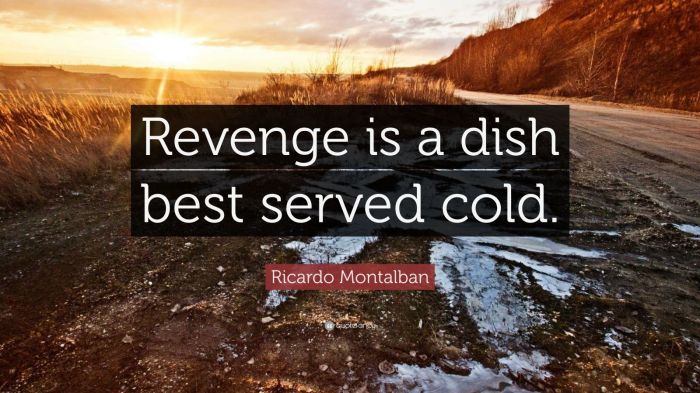Quotes about revenge in Frankensteinoffer profound insights into the destructive nature of retribution, exploring the psychological, moral, and ethical implications of seeking vengeance. Mary Shelley’s masterpiece delves into the consequences of revenge, revealing its corrosive effects on individuals and society as a whole.
This literary analysis examines the significance of revenge as a driving force in the novel, analyzing the motivations and actions of characters seeking vengeance. It explores the ethical dilemmas posed by the pursuit of retribution and the dangers of allowing revenge to consume one’s life.
Revenge as a Theme in Frankenstein: Quotes About Revenge In Frankenstein

Revenge is a driving force in Frankenstein, motivating characters to commit acts of violence and destruction. The novel explores the moral implications of revenge and the destructive consequences it can have.
Characters Seeking Revenge
- Victor Frankenstein:Driven by guilt and fear, Victor seeks revenge against the monster he created.
- The Monster:Desiring revenge for the abandonment and cruelty he has suffered, the monster targets Victor and his loved ones.
Consequences of Revenge
- Violence and Death:Revenge leads to a cycle of violence, resulting in the deaths of several characters.
- Psychological Torment:Both Victor and the monster are consumed by their desire for revenge, leading to mental anguish and self-destruction.
- Moral Corruption:The pursuit of revenge corrupts Victor’s morals, leading him to abandon his ethical principles.
The Monster’s Desire for Revenge
The monster’s desire for revenge is motivated by the abandonment and cruelty he has endured. He feels betrayed by Victor and the society that rejects him.
Psychological and Emotional Factors, Quotes about revenge in frankenstein
- Loneliness and Isolation:The monster’s loneliness and isolation fuel his anger and desire for revenge.
- Rejection and Hatred:The rejection and hatred he faces from society make him feel isolated and bitter.
- Desire for Justice:The monster believes that he deserves justice for the wrongs that have been done to him.
Ethical Dilemmas
The monster’s actions raise ethical dilemmas. While his desire for revenge is understandable, his methods are often cruel and destructive.
Victor Frankenstein’s Role in the Cycle of Revenge
Victor Frankenstein’s actions contribute to the cycle of revenge. His abandonment of the monster creates the conditions for the monster’s anger and desire for vengeance.
Fear and Guilt
- Fear:Victor fears the monster’s power and the threat it poses to him and his loved ones.
- Guilt:Victor feels guilty for creating the monster and for the suffering it has caused.
Consequences for Victor
- Obsession and Madness:Victor’s obsession with revenge consumes him, leading to madness.
- Death:Victor’s pursuit of the monster ultimately leads to his own death.
The Dangers of Revenge
Frankensteinillustrates the destructive nature of revenge. Revenge can lead to further violence, suffering, and moral corruption.
Examples from the Novel
- The monster’s murder of Victor’s brother, William.
- Victor’s pursuit of the monster across the Arctic.
- The monster’s destruction of Victor’s family and friends.
Importance of Forgiveness and Reconciliation
In contrast to the destructive cycle of revenge, Frankensteinsuggests the importance of forgiveness and reconciliation. The novel shows that forgiveness can break the cycle of violence and lead to healing.
FAQ Overview
What is the significance of revenge in Frankenstein?
Revenge serves as a central theme in Frankenstein, driving the actions and motivations of several characters. It explores the corrosive effects of revenge on individuals and society, highlighting its destructive nature.
How does the monster’s desire for revenge shape the novel?
The monster’s desire for revenge against Victor Frankenstein is a key element of the plot. His pursuit of vengeance is fueled by a combination of psychological and emotional factors, including anger, abandonment, and a longing for justice.
What are the ethical dilemmas posed by the monster’s actions?
The monster’s actions raise ethical questions about the nature of revenge and the limits of retribution. His pursuit of vengeance raises questions about the morality of punishing the innocent and the consequences of allowing anger to consume one’s life.

